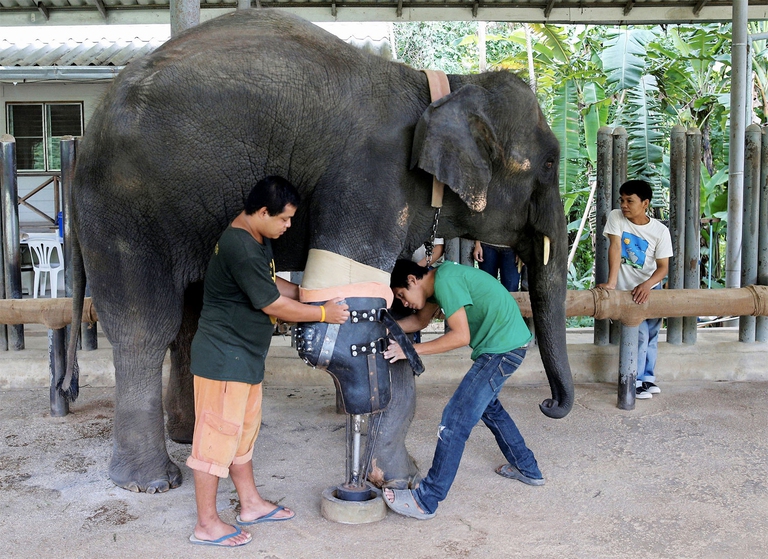
A report by Ember explains that in 2025 electricity generation from renewables (solar, wind and hydropower) surpassed that from fossil fuel sources.
Mosha was only 7 months old when she was maimed. She stepped on a land mine on the border between Thailand and Myanmar. More than ten years have passed from that. This week, she received her new prosthetic leg (the ninth) thanks to the Friends of the Asian Elephant Foundation, an hospital in northern Thailand. Along with Mosha,
Mosha was only 7 months old when she was maimed. She stepped on a land mine on the border between Thailand and Myanmar. More than ten years have passed from that.
This week, she received her new prosthetic leg (the ninth) thanks to the Friends of the Asian Elephant Foundation, an hospital in northern Thailand.
Along with Mosha, other 15 elephants have been wounded by land mines in neighbouring regions, which are stage to dreadful wars and conflicts. However, she was the first one to receive a prosthetic limb thanks to a Lampang hospital.
Mosha weighed 600kg when the accident occurred. Now, she weighs nearly 2 tonnes and, by growing up, vets had to adapt their prosthetic leg or create new ones.
Another elephant, Motala, lost her leg in a land mine accident in the same region in 1999. She is 50 years old and was featured in The Eyes of Thailand, a 2012 documentary that tells how it was possible to give her a new artificial limb.
Many professionals took part in the operation, including orthopaedic Therdchai Jivacate, who said that elephants that don’t receive prosthetic legs are destined to die.
When Mosha received her new prothesis Jivacate told Reuters: “The way she walked was unbalanced, and her spine was going to bend. That means she would have hurt her cartilages badly and eventually stopped walking. And she would have died because of that.”
The Thai Elephant Conservation Center estimates that 2,000 to 3,000 elephants live in the wild in Thailand, along with other 2,700 domesticated individuals.
The resources and particular care for Mosha and other elephants shouldn’t be cause for surprise. The relationship between Thailand and elephants dates back to many centuries ago. These animals were employed to carry out heavy works, to transport people and tree trunks during deforestation operations. Their training is a result of an ancient tradition and the profession of trainer (mahout) is handed down from a generation to another. Most of all, elephants are traditionally loved, respected and celebrated during festivals and annual events.
About 64,000 land mine accidents have occurred in the border regions of Thailand, Myanmar and Cambodia since 1979. According to Halo, international organisation dedicated to remove land mines, these areas are home to about 25,000 people who have been maimed by land mines, one of the world’s highest rates of amputations per capita.
Siamo anche su WhatsApp. Segui il canale ufficiale LifeGate per restare aggiornata, aggiornato sulle ultime notizie e sulle nostre attività.
![]()
Quest'opera è distribuita con Licenza Creative Commons Attribuzione - Non commerciale - Non opere derivate 4.0 Internazionale.
A report by Ember explains that in 2025 electricity generation from renewables (solar, wind and hydropower) surpassed that from fossil fuel sources.
The Tyler Prize, considered the “Nobel Prize for the Environment,” has been awarded to Toby Kiers, an American biologist working in Amsterdam.
Belgium is one of the countries most exposed to climate change. Dune–dikes are a solution to curb sea-level rise.
Between October 2024 and September 2025, the average temperature in the Arctic was 1.6 degrees Celsius higher than during the 1991–2020 period.
Undeclared conflicts of interest, paid authors, lack of transparency: one of the most cited studies on glyphosate, published in 2000, has been retracted.
The Copernicus service has released data for the first eleven months of 2025: global warming is set to come close to last year’s record.
The European Council and Parliament have reached an agreement on the European Commission’s proposal to deregulate new GMOs. But farming, organic agriculture, and environmental organizations are calling for it to be stopped.
The world’s second-largest producer has taken a historic decision. However, farms will have until 2034 to shut down.
A Greenpeace report denounces Russia’s political and economic model: a nexus of extractivism, authoritarianism and war that is destroying the environment, with serious repercussions for the global ecosystem.








